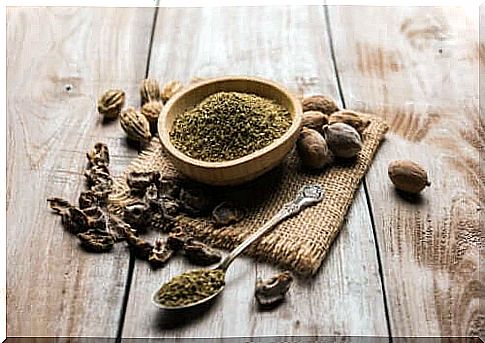Triphala: What Is It And What Are Its Benefits?

Triphala, also known as “triphala churna” or “Himalayan triphala”, is a herbal mixture derived from traditional Ayurvedic medicine. Its Sanskrit name translates as “three fruits” because it contains Indian gooseberry (Emblica officinalis), black mirobalan (Terminalia chebula) and mirobalan bellerico (Terminalia belerica).
Due to its pharmacological composition, triphala has been used as an adjuvant that improves health, especially in ailments of the digestive system, inflammation and oral cavity problems.
It is even said that it can help you manage your weight. Is there evidence in this regard? Is it safe to consume? We describe it all in detail here.
What is triphala and what does it consist of?
Triphala is a herbal formula often used in Ayurvedic medicine. According to information published in the Journal of Alternative and Complementary Medicine , it is obtained from the dried fruits of plants.
Emblica officinalis ( Euphorbiaceae family ), Terminalia bellerica ( Combretaceae family ) and Terminalia chebula ( Combretaceae family ), originating from the Indian subcontinent, are the ingredients of this supplement.
Historical data shows that triphali has been in use for over 1000 years. Its name appears in the texts of Dr. Charak, who suggested that consuming it daily allows one to live “a hundred years without disease”. Since then, it has been used as an ally in supporting well-being and improving health.

Components of the triphala mixture
The main ingredients of triphala are tannins, gallic acid, ellagic acid, and quebulinic acid. they belong to the antioxidants, which explains many of the healing effects of the Indian mix of life.
Now let’s take a closer look at the properties of the plants used in its preparation, which are as follows:
- Indian gooseberry or Emblica officinalis : this fruit and its extracts are used to improve the health of the digestive system and prevent the occurrence of chronic diseases. It contains nutrients such as vitamins A and C, minerals and amino acids. In addition, according to Phytotherapy Research data, they are a source of, inter alia, phenols, tannins, curcuminoids.
- Black mirobalan or Terminalia bellirica : in Ayurvedic medicine it is known as bibhitak. It is distinguished by the content of tannins, ellagic acid, gallic acid, lignans and flavones. In addition, it has antibacterial, anti-inflammatory and anti-diabetic properties.
- Mirobalán bellerico or Terminalia belerica : another name is haritaki. In Ayurveda, he is said to be “the king of drugs”. According to an article published in the Asian Pacific Journal of Tropical Biomedicine , it contains phytochemicals such as terpenes, polyphenols, anthocyanins, and flavonoids. In addition, it is used as an anti-inflammatory, antioxidant and digestive agent.
What are the benefits of triphali?
Ayurvedic medicine attributes a whole host of different benefits to triphala. Many of its effects can be linked to its laxative properties as it is believed to help “cleanse the body”.
Likewise, its potential as an antioxidant, anti-inflammatory and antibacterial agent is recognized. But what does the evidence say?
Natural laxative
Triphala has been a supplement that fights constipation and other digestive ailments for years. In fact, this supplement is marketed as an alternative to over-the-counter laxatives.
Accordingly, a study published in the Iranian Journal of Pharmacology and Therapeutics found that a laxative from triphali and other plants was useful for reducing defecation effort and achieving a more complete evacuation.
Also, studies in the J ournal of Ayurveda and Integrative Medicine have shown that this herbal preparation reduces constipation, abdominal pain and gas in patients with gastrointestinal disorders.
Slimming
It should be remembered that weight loss depends on many factors, among which diet is of great importance. Still, supplements like triphala can serve as a weight loss aid, though not in a miraculous way.
In an animal study published by Alternative Therapies in Health and Medicine, rats supplemented with triphala showed significant weight loss. Likewise, their energy consumption and fat levels were lower than in those who did not receive the preparation.
Other studies in obese adults also showed promising results. Those who received a daily dose of 10 grams of triphala saw a reduction in waist and hip circumference. In addition, weight loss was also noted.
Oral health
In Ayurvedic medicine, triphala is used as a medicine for oral diseases. In particular, its antimicrobial and anti-inflammatory properties are used to reduce gingivitis (gingivitis), cavities and plaque.
Although we still have limited evidence, a study published in the International Journal of Ayurveda Research found that triphala extract mouthwash reduced plaque build-up and bacterial growth in the mouth.
This was confirmed in a study published in the Journal of Periodontal & Implant Science. It found that a triphala mouthwash helped reduce plaque and control gingivitis.
Anti-inflammatory effect
Many of the healing properties of triphala are related to its anti-inflammatory potential. The publication in Phytotherapy Research states that the mixture of plants in this preparation contains, among others, vitamin C, flavonoids, polyphenols, tannins and saponins.
These compounds not only affect inflammatory processes in the body, but also act as antioxidants. In this way, they reduce the effects of oxidative stress associated with many different diseases, such as cardiovascular disease, arthritis and diabetes.
Threats and contraindications of triphala
Triphala is considered safe for most healthy adults. Still, it can cause some side effects such as diarrhea and abdominal discomfort, especially when used in very high doses.
It is not recommended for use in pregnant or lactating women or children, as the safety level in these groups is unknown.
Similarly, it is not recommended to use it in people who have already been diagnosed with diseases or are undergoing treatment. In such cases, it’s best to consult a professional before taking the supplement.
In addition, be aware that triphala can interact with or make medications less effective, such as:
- Anticoagulants
- Drugs for cardiac arrhythmias
- Anticonvulsants
- Unusual antidepressants such as nefazodone.
- Immunosuppressants.
- Opioid painkillers.

How is triphala eaten?
Today, Triphala is available as capsules, powder or liquid. You can find it in online stores or health food stores.
It is important to follow the dosage recommended on the label as too much can cause adverse reactions. It is often recommended to take 500 milligrams to 1 gram per day for constipation.
The liquid version can be diluted in a glass of water to create a mouthwash. Additionally, it can be mixed with warm water and honey to take advantage of other healing properties. If you choose the latter option, take the drink before your main meals. When in doubt, consult your doctor or herbalist.
What should you remember about this Ayurvedic medicine?
Triphala is a combination of three plants widely used in Ayurvedic medicine. Since ancient times, it has been credited with various healing properties, which popularized its use as a supplement.
While research is still limited, evidence suggests it has antioxidant, anti-inflammatory, and antimicrobial potential.
In any case, the supplement should be used in moderation, not exceeding the doses recommended by the manufacturer. In addition, it should not replace medical treatments or be used concomitantly with medications. To avoid inconvenience, buy supplements from reputable sites.









